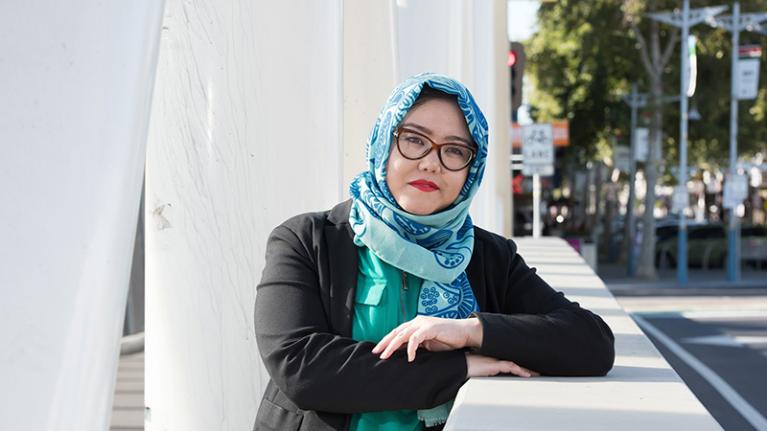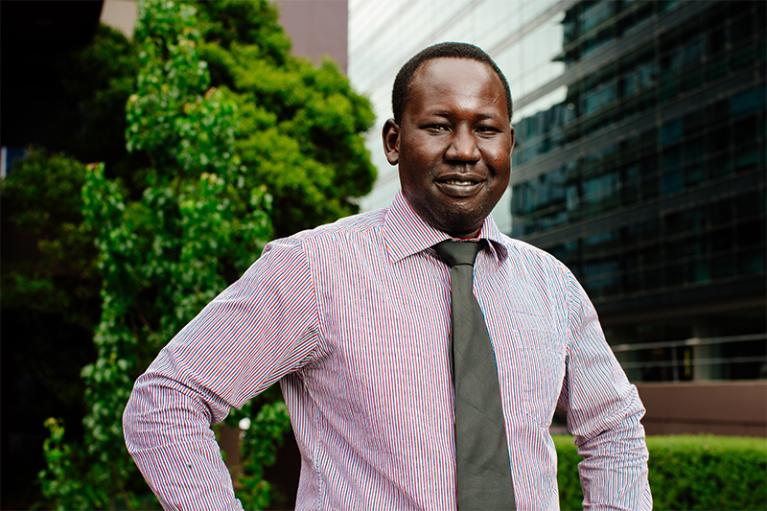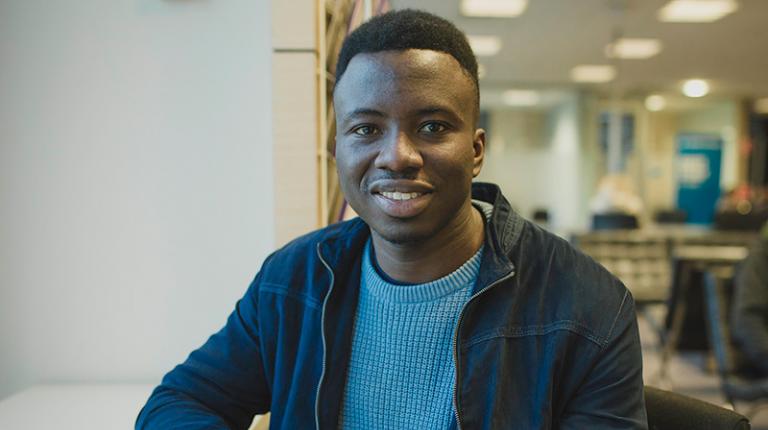Overview
Gain a solid foundation in research methods before undertaking a thesis related to any of the disciplines within 'sustainable and liveable cities'. The Master of Applied Research is designed for bachelor graduates in any discipline.
When you undertake a Master of Applied Research at Victoria University, you'll study crucial topics to set you on the path to success, including research methods, ethics, project-design, and disciplinary expertise relevant to your research. On passing the units with a 70% average, you’ll begin your own research in a field of personal passion and interest.
For your original thesis, you'll receive expert guidance from leading researchers within our 'Sustainable industries and liveable cities' research group, which includes:
- Institute for Sustainable Industries and Liveable Cities
- Centre of Policy Studies (CoPS)
- Centre for International Research on Education Systems (CIRES)
- Moondani Balluk.
In your chosen area of research – as diverse as arts, business, computer science, education, engineering, economics, science, law, and sociology – you'll address important contemporary issues such as:
- climate change
- cultural diversity, arts and social justice
- technology in future industries, education and related policy
- urban planning.
Further opportunities exist to complete a Masters of Research in the Institute for Health & Sport.
High research rankings
VU is recognised for research excellence – in the latest Excellence in Research for Australia rankings, we were rated above world standard for our engineering, mathematical sciences, and applied-mathematics areas, among others.
We have also been ranked:
- 2nd in Victoria for computer science
- 3rd in Victoria for engineering & technology (Times Higher Education).
World-class facilities
Engineering & science labs
Victoria University has high-tech laboratories and equipment that enable our innovative research.
These include:
- computer modelling software packages including GIS and REALM
- controlled-temperature rooms for botanical work
- dynamics labs including drop- and shock-testing and thermal-imaging equipment
- e-health software and systems, including PhysAnalyser & GP E-connect
- fluid mechanics and hydraulics lab
- large-scale structural fire-test furnace
- materials engineering labs
- PCR molecular labs
- pluviometers, flowmeters, and water-quality monitoring equipment
- polymer research lab.
Libraries & special collections
The VU Library holds several special collections and archives that are available to assist graduate students and staff in their research.
Partnerships & collaboration
We have working partnerships with most universities in Victoria, and several large industry and government departments.
Our collaborative partners include the following, among many others:
- Attorney-General’s Department
- Australian Federal Police
- Australian Multicultural Foundation
- Australian Social Policy Institute (ASPI)
- Cross Yarra Tunnel
- Defence Science and Technology Group (DST Group)
- Greater Western Water
- GWMWater
- Islamic Council of Victoria (ICV)
- Melbourne City Mission
- Melbourne Metro
- Memcor
- NEXUS Online
- Oztron Energy
- Peter Mac Cancer Centre
- Sunshine Hospital
- Telstra
- The University of Texas El Paso (UTEP)
- United Energy
- World Health Organization (WHO).
Centres & institutes
Our research is aligned with two interdisciplinary flagship research themes, delivered through six research focus areas.
Sustainable industries and liveable cities research is undertaken by:
- Institute for Sustainable Industries and Liveable Cities
- Centre of Policy Studies (CoPS) – economic-modelling research
- Centre for International Research on Education Systems (CIRES)
- Moondani Balluk.
You'll have access to expertise in our collaborative law and policy institutes:
- The Mitchell Institute – health and education policy
- Sir Zelman Cowen Centre – law-related topics for industry, government and the community.
You can also undertake a masters through VU's Institute for Health and Sport.
Research programs
Conduct research that addresses major challenges faced by communities and industries. We offer leading supervision in several areas:
- Cultural Diversity: Migration and mobility; Social inclusion, cohesion and equity; Access to justice; Community services; Creative arts
- Urbanisation – Leading Urban Planning for the West & Beyond: Infrastructure and services; Urban and peri-urban planning; Quality of life
- Climate Change: Impact analysis, mitigation and adaptation; Infrastructure and planning; Risk analysis and management; Decision support
- Industrial Futures Preparing Technology-driven Futures: Technological change; Product innovation; Economic policy; Regulation and governance
- Future of Work: Technological change; Micro, small and medium business; Skill and knowledge development.
Research scholarships
Victoria University has several generous research scholarships available for successful Master of Applied Research students. These scholarships are highly competitive.
There are also externally funded scholarships from dozens of organisations, some of which are aimed at postgraduate students.
Research opportunities & development
VU Research gives you opportunities to:
- connect with other researchers
- participate in research festivals and competitions
- develop your research skills
- get funding for your research
- publish and promote your findings.
We offer support for graduate researchers including:
- an orientation program
- a specialised Graduate Research School
- study spaces within your disciplinary area
- units to help you conceptualise and contextualise your research
- research ambassadors and student association.
Find out more about graduate opportunities at VU.
Study in your chosen discipline
Victoria University offers expert supervision for masters research in these areas:
- Applied Science
- Arts
- Biomedical Sciences
- Biotechnology
- Business
- Chemical Sciences
- Civil and Building Engineering
- Computer Science and Mathematics
- Education
- Electrical Engineering
- Environmental and Risk Engineering
- Food Science
- Law and Justice
- Mechanical Engineering
- Nursing
- Physics
- Sport and Recreation
Some of these disciplines will be better aligned with a Masters of Research in the Institute for Health & Sport.
A Master by Research to match your needs
Victoria University offers Master of Research options to fit your experience and qualifications.
Our Master of Applied Research allows graduates of any bachelor program to move into a different discipline, with the support needed to prepare for high-quality study.
Within our Sustainable Industries and Liveable Cities focus areas, we also offer:
- Master of Research – an 18-month, full-time program for students with a relevant bachelor degree, or honours degree in a different discipline.
- Master of Research Practice – a one-year program for students with an honours degree in a relevant discipline.
You can also undertake a Master of Applied Research, or choose from the same suite of research degrees, within our health and sport focus area.
Course e-Brochure
Create a customised brochure in a few simple steps. Your brochure will include country-specific information.
Create an e-brochure


Careers
A masters degree is increasingly important for a professional career. The Master of Applied Research will ensure you are prepared to enter the competitive job market.
This course could lead to a career as researcher or academic tutor, and prepare you for a senior role in a number of specialist fields.
You'll have the experience and confidence to take a leading position in a range of fields related to your discipline:
- education in schools or other settings
- policy making and development
- public-sector research or writing
- programmer or IT specialist
- scientist.
Course structure
To attain the Master of Applied Research, students will be required to complete the below mentioned components consisting of:
- Required coursework units with a minimum average of 70% or have approved advanced standing for the unit(s)
- A Research Thesis unit and have had their thesis classified as passed by the Dean, Graduate Research (or nominee)
Course structure and units
Core Units
-
- Unit code
- UGR7001
- Credits
- 12
-
- Unit code
- UGR7002
- Credits
- 12
-
- Unit code
- UGR7003
- Credits
- 12
Plus
144 credit points of Thesis Units
And
12 credit points of Advanced Disciplinary learning undertaken through the following flexible curriculum unit, to be negotiated by the supervisor and Master of Applied Research coordinator:
-
- Unit code
- UGR7006
- Credits
- 12
Thesis Units
Applied Science
-
- Unit code
- SHM8002
Arts
-
- Unit code
- APR8003
Biomedical Sciences
-
- Unit code
- RBM8004
Biotechnology
-
- Unit code
- RBT8003
Business
-
- Unit code
- BMO8012
Chemical Sciences
-
- Unit code
- RCS8003
Civil and Building Engineering
-
- Unit code
- VCC8003
Computer Science and Mathematics
-
- Unit code
- RCM8003
Education
-
- Unit code
- AER8012
Electrical Engineering
-
- Unit code
- VEE8003
Environmental and Risk Engineering
-
- Unit code
- VQT8004
Food Science
-
- Unit code
- RBF8003
Law and Justice
-
- Unit code
- BLO8012
Mechanical Engineering
-
- Unit code
- VMR8003
Nursing
-
- Unit code
- HNM8002
Physics
-
- Unit code
- RPH8003
Sport Science
-
- Unit code
- SSR8002
Learning outcomes
The new Master of Applied Research at VU provides students with the opportunity to undertake and complete a research project under supervision at masters level (AQF 9). It will achieve this by providing students with a range of initial coursework units covering a) the nature and expectation of the research process and b) disciplinary specialisations where appropriate. The research progress will also be scaffolded by milestone requirements ensuring support throughout and quality and timely submission of the research.
AQF level 9 criteria: Graduates at this level will have specialised knowledge and skills for research, and/or professional practice and/or further learning and be able to:
On successful completion of this unit, students will be able to:
- Demonstrate an advanced understanding of fundamental principles and current debates about ethics and integrity in research;
- Demonstrate familiarity with relevant national codes and university policies that impact on research practice and appropriate conduct in various research environments;
- Identify key areas of ethics and integrity that relate to their own area of research practice
- Demonstrate ability to critically evaluate options and approaches to resolve issues in research integrity and ethics that may arise in their field of research; and
- Critically defend a position in relation to research ethics and integrity as it relates to their own area of research practice and design of their own research project.
- Develop skills of advanced written and spoken academic communication.
Application of Knowledge and Skills
Graduates of a Master of Applied Research will demonstrate the application of knowledge & skills:
- with creativity and initiative to new situations and/or for further learning
- with high level personal autonomy and accountability
- to plan and execute a substantial piece of research
What's a unit?
A unit or 'subject' is the actual class you'll attend in the process of completing a course.
Most courses have a mixture of compulsory 'core' units that you need to take and optional elective units that you can choose to take based on your area of interest, expertise or experience.
Credits
Each unit is worth a set amount of study credits based on the amount of time you study. Generally, 1 credit is equal to 1 hour of study per week.
Admission & pathways
Meeting the minimum admission requirements does not guarantee you entry into this course. Some courses receive more applications than the number of places available. In this situation we will also assess your education, work and other relevant experience.
If you do not meet the minimum requirements you may be eligible for one of our special admission programs. We also encourage you to explore our study pathways to help you reach your goal.
Find out more about how to apply for our courses, and our commitment to admissions transparency.
Entry requirements
Completion of an Australian Bachelor degree (or equivalent) in any discipline with an average grade of Distinction (or equivalent) in the final year.
PLUS
Demonstrate English competency sufficient for study at masters level by providing evidence of one or more of the following:
- completion of one or more degrees with English as the language of instruction and assessment, undertaken in a predominantly English-speaking context (within the last two years)
- IELTS (or equivalent) overall score of 6.5 (with no band less than 6.0 in Listening, Reading, Writing and Speaking)
- a score of not less than 92 with no section score less than 22 in the internet-based Teaching of English Foreign Language (TOEFL) test, or English proficiency equivalent
- other documented proof of English proficiency equivalent to the above.
Find out if you meet the entry requirements, including English language and academic requirements.
Pathways from VU courses
There are many ways you can start your education journey at VU. Pathways offer an easy transition between courses at different levels, so that you can start with a certificate and progress right through to postgraduate study.
Find out more about pathways and credits.
Credit for skills and past study
Use our credit calculator to find out how much credit you could get towards your course, based on your previous study.
If you have completed study with another university or institution and believe you are eligible to receive credit for skills and past study, you can apply for advanced standing.
Applications for advanced standing can be made after a discussion with your course chair or academic adviser.
How to apply
We are currently accepting international applications, and we welcome you to apply for this course.
Click 'apply' to begin, and we will guide you through the application process.
International fees
The following fees apply per semester:
- Applied Science: A$15,200
- Arts: A$13,100
- Biomedical Sciences: A$16,700
- Biotechnology: A$16,700
- Business: A$17,000
- Chemical Sciences: A$16,700
- Civil and Building Engineering: A$17,000
- Computer Science and Mathematics: A$15,200
- Education: A$14,300
- Electrical Engineering: A$17,000
- Environmental and Risk Engineering: A$17,000
- Food Science: A$16,700
- Law and Justice: A$17,000
- Mechanical Engineering : A$17,000
- Nursing: A$14,900
- Physics: A$15,200
- Sport Science: A$15,200
Apply
If you have questions, please get in touch:
- Phone: +61 3 9199 1164
- Email: [email protected]
- Online: enquiry form
Information and fees listed above are for non-resident students. Fees are accurate at the time of viewing and will be subject to annual increases. Some courses require students to purchase equipment or clothing that they will need in the course. These equipment or clothing costs are not included in the course fees listed above – check your Letter of Offer for an estimate on non-tuition-fee-related expenses.
VU takes care to ensure the accuracy of this course information, but reserves the right to change or withdraw courses offered at any time. Please check that course information is current with the Student Contact Centre.



